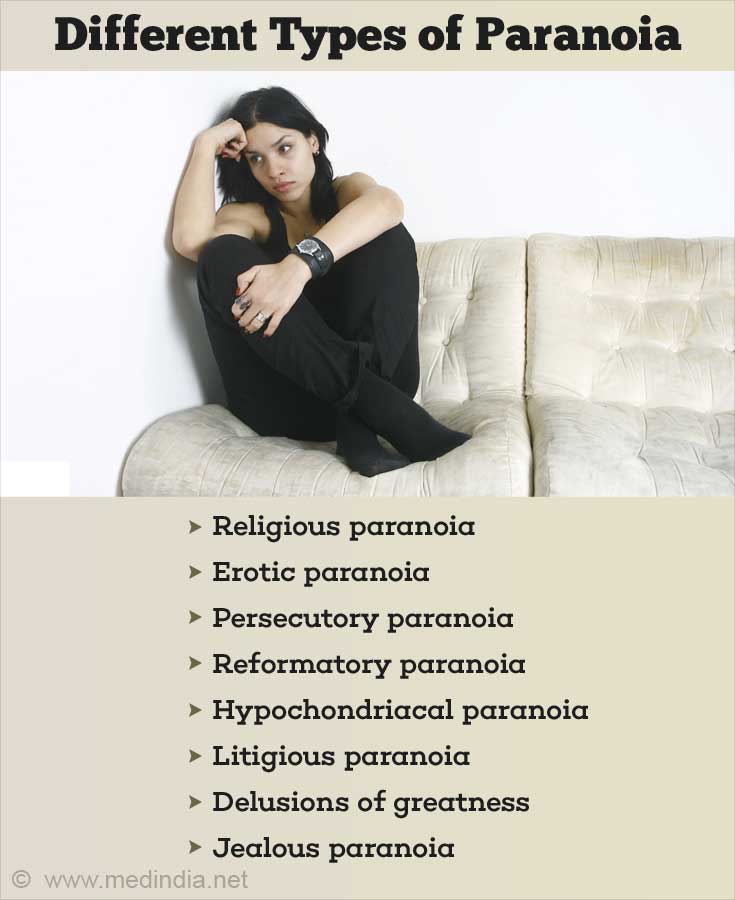- Freeman D, Garety P. Helping patients with paranoid and suspicious thoughts: a cognitive-behavioural approach. Adv Psych Treat. 2006;12(6):404-415.
- Kendler KS. The clinical features of paranois in the 20th century and their representation in diagnostic criteria from DSM-III through DSM-5. Schizophrenia Bulletin. 2017;43(2):332-343.
- Freeman D et al. Insomnia and paranoia. Schizophrenia Research. 2009;108(1-3):280-284 - (doi:10.1016/j.schres.2008.12.001.)
- Manfredi T. The causes of paranoia. Health Guidance. Accessed 7 Feb 2018.
- Freeman D et al. How Cannabis Causes Paranoia: Using the Intravenous Administration of ∆ 9 -Tetrahydrocannabinol (THC) to Identify Key Cognitive Mechanisms Leading to Paranoia, Schizophrenia Bulletin. 2015; Vol 41 (2):391–399. https://doi.org/10.1093/schbul/sbu098 - (doi:10.1037/a0035258.)
- Manschreck TC. Delusional disorder: the recognition and management of paranoia. J Clin Psychiatry. 1996;57 (Suppl 3):32- 38.
- Iacovino JM, Jackson JJ, Oltmanns TF. The Relative Impact of Socioeconomic Status and Childhood Trauma on Black-White Differences in Paranoid Personality Disorder Symptoms. Journal of abnormal psychology. 2014;123(1):225-230 - (doi:10.1037/a0035258.)
- Harper, D. J. (2011). Social inequality and the diagnosis of paranoia. Health Sociology Review, 20(4), 423-436. - (doi:10.1037/a0035258.)
- Vyas A, Khan M. Paranoid personality disorder. Am J Psych Res J. 2016. 11(1):9-11. - (doi:10.1037/a0035258.)
- Angstman KB, Rasmussen NH. Personality disorders: Review and clinical application in daily practice. Am Fam Phys. 2011;84(11):1253-1260. - (doi:10.1037/a0035258.)
What is Paranoia?
Paranoia is having a false belief or delusion. Paranoia is a relatively rare syndrome that was first characterized by Dr. Kraepelin in 1899. It is a symptom of individuals when they feel (rather irrationally) that others are targeting or threatening them through comments or actions. A paranoid individual develops an abnormal and intense suspicion and mistrust in other people and fails to have a social life. Paranoia is a predominant symptom of three disorders namely paranoid personality disorder, schizophrenia, and delusional disorders. Paranoid individuals suffer from permanent delusions. The delusions vary from jealousy, hypochondria to persecution.
It is interesting to note that paranoia is not just observed in psychotic patients but the general population as well.
Important Mental Conditions Marked By Paranoia
- Paranoid personality disorder (PPD): It is considered the mildest type of paranoia and most persons with PPD function quite normally. It is an inherent personality trait, and the associated behavior and attitudes are present during much of the person’s life.
- Delusional (paranoid) disorder: Presence of a single dominant delusion or false belief such as delusion of persecution, for example when a person believes that his boss is spying on him, the delusion of a terrible illness despite reassurances by doctors.
- Paranoid schizophrenia: This is the most severe form of paranoia and seriously limits daily functioning and relationships and requires treatment. For example, the affected person may believe that they have landed on the moon, report hearing voices that control their every action, see things that are not there, along with other bizarre symptoms associated with this condition.
What are the Different Types of Paranoia?
There are different types of paranoia as listed below:
- Religious paranoia – The individual feels the world is coming to an end or he/she is God’s messenger.
- Erotic paranoia (erotomania) – The individual feels an unknown person (e.g., a celebrity) likes him/her.
- Persecutory paranoia – Paranoid individuals feel they are surrounded by enemies intent on causing harm or death to them.
- Reformatory paranoia – In such cases, individuals feel they can cure or reform everyone who is suffering around them.
- Hypochondriacal paranoia – Individuals feel they are suffering from a disease and consult doctors frequently for second opinions.
- Litigious paranoia – Individuals tend to file cases against those who they feel have wronged them.
- Delusions of greatness – In such cases, individuals feel they are very important or powerful, and this can correlate with persecutory paranoia making them think they are targets of harm or death.
- Jealous paranoia – Individuals feel suspicious of their sexual partner.

What are the Causes of Paranoia?
It is hard to pinpoint what causes paranoia. Some contributory factors are listed below:
- Genes – In the case of paranoid personality disorder (PPD), genes may play a role as PPD is observed in families that exhibit a prevalence of delusional disorders or schizophrenia.
- Insomnia – Paranoia may be a result of insomnia since lack of sleep can trigger anxiety and depression, which are also factors that cause paranoia.
- Trauma – When an individual experiences traumatic life events, it can alter the individual’s perception of life and create paranoid thoughts.
- Altered brain chemistry – Certain drugs, such as amphetamines, cocaine, and marijuana along with substances like alcohol can alter the signaling within the brain causing paranoia.
- Stress – Prolonged periods of stress as seen in the case of prisoners of war can lead to paranoia.
- Socioeconomic status and race – Lower socioeconomic status and racial differences influence the quality of health services provided. Hence, paranoid individuals tend to be higher in underprivileged sections of society.
- Combination of causes – One must be aware that paranoia may be due to a combination of any of the above factors and not caused by one single factor alone.

What are the Symptoms of Paranoia?
Following are the symptoms associated with paranoia:
- Negative beliefs that develop during childhood about others, self, or the world following certain experiences
- Anxiety and irrational fear
- Reaching conclusions without a clear understanding
- Inability to think of alternate explanations
- Abnormal experiences
- Cognitive irregularities
- Aggressive, argumentative, hostile
- Intensely suspicious nature
- Gets offended quickly
- Trust issues – unable to confide in anyone, inability to maintain a relationship
- Inability to forgive and forget
- Inability to compromise
- Inability to take criticism
- Feels persecuted or victimized by everyone in the world
- Hostility towards others due to mistrust
- Detachment
How is Paranoia Diagnosed?
Paranoia is diagnosed by the presence of characteristic symptoms during history taking and thorough psychological evaluation. Cognitive-behavioural therapy can effectively treat paranoia with patient cooperation.
Paranoia is a symptom observed in many mental disorders. Hence, diagnosing paranoia can be quite difficult. An effective diagnosis can be made only if the patient is affected with paranoia for at least a month. Diagnosis is carried out as follows:
- Symptom assessment
- Medical history to rule out other illnesses as the possible cause of the symptoms
- Physical examination
- Diagnosis of exclusion – rule out other psychiatric conditions that may display similar symptoms (e.g., mood disorder, schizophrenia, substance-induced toxicity, and medical disease).
- Psychological assessments to determine mental health status
How is Paranoia Treated?
There is no permanent cure for paranoia. Patients are often reluctant to get treatment and hence, there is very limited research on paranoia treatment. Also, these patients may not trust doctors or therapists making treatment difficult. The management strategy ideally involves hospitalization, medications, and psychotherapy.
Cognitive-behavioral therapy – There is evidence that this form of psychotherapy is useful in reducing symptoms of psychosis by nearly half, reducing relapse rates and improving recovery speed. This form of therapy requires patient-therapist collaboration and empathy from the therapist. The CBT therapy is required once a week for six months. The therapist listens and takes notes of the paranoid experiences of the patient and then discusses the issues affecting the patient. Decisions on how to tackle these paranoid states are provided to the patient, but at the same time, the patient is involved in the decision-making process.

Medications – Anti-anxiety or anti-psychotic drugs are prescribed by therapists for psychotic conditions, such as delusional conditions, psychosis or schizophrenia. Also, the person may refuse to take medications fearing it may cause harm. There are no FDA-approved drugs for paranoid personality disorder.
Hospitalization – If the patient has a bad case of paranoia, then hospitalization is recommended until the underlying condition stabilizes.
Coping mechanisms – Patients are taught to drop their defenses and learn to face people and situations in the virtual world (by simulating situations) to prepare themselves for similar situations encountered in the real outside world. A study found patients were able to relax and felt more confident when they stepped into the real world in similar situations. Other options include practicing relaxation techniques and behavioral modification therapy.
How can Paranoia be Prevented?
Paranoia is a condition that can be effectively tackled with the help of an empathetic and supportive clinician. Clinicians can help to tackle depression, structure time, introduce helpful activities and reduce negative self-worth.
Based on the cause, avoiding recreational drugs or alcohol could mitigate the symptoms.
Self-help strategies to overcome paranoia are:
- Do not focus on suspicious thoughts but focus on the action of the moment
- Challenge irrational suspicious thoughts
- Spend less time worrying about paranoid thoughts
- Become detached and observe the fears
- Try and understand paranoid fears before accepting them
- Try and understand the cause of paranoid thoughts
A therapist can identify the triggers of paranoia and provide strategies to avoid the recurrence of paranoia.









